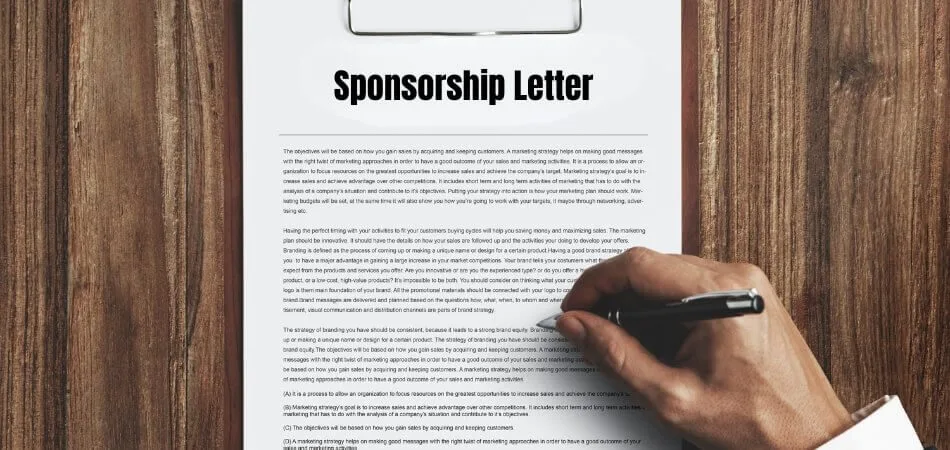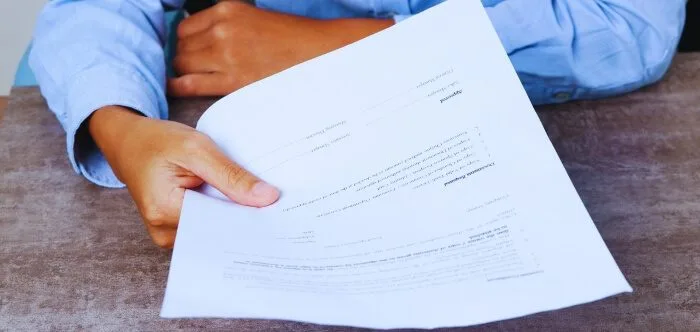Organizing a conference involves many moving parts, and one of the most critical aspects is securing sponsors. These partnerships are essential to the event’s success and sustainability. If you’re wondering how to approach this important task, you might be asking yourself, “How do you write a sponsorship letter for a conference?”
To write an effective sponsorship letter, start by knowing your audience. Research potential sponsors’ markets, values, and sponsorship history. Introduce the conference, describe its benefits to sponsors, and offer sponsorship opportunities. You can significantly increase your chances of success by personalizing your approach and concluding with a clear call to action.
Still curious about how to write the perfect sponsorship letter? This article will provide you with all the necessary information to guide you through the process and help you create impactful proposals that engage with potential sponsors.
What is Conference Sponsorship and How Does it Work?
A conference sponsorship is a business-conference partnership that benefits both parties. The business provides financial support or services in exchange for marketing opportunities. This arrangement helps cover the conference’s costs while offering sponsors exposure to a targeted audience.
The process begins with the organizer identifying potential sponsors whose business interests align with the conference theme. Organizers of prestigious events present personalized sponsorship packages, offering various levels of visibility and engagement. These packages can include logo placement, speaking opportunities, or exhibition space, catering to different sponsor needs and budgets.
In return, sponsors gain access to a niche market, increasing brand awareness and potentially driving sales. A well-written sponsorship letter for a conference can play a crucial role in securing these partnerships, providing sponsors with the right opportunities to engage with attendees directly. As a result, both parties benefit, with the conference receiving essential support and the sponsor achieving specific marketing goals.
Why Is It Important to Approach Companies for Conference Sponsorship?
Seeking sponsorship from companies is a smart strategy that can significantly improve your event’s success. Although securing sponsorship can be challenging, the benefits for both organizers and sponsors create lasting partnerships beyond just financial support.
Securing Financial Support for Your Event
One of the main reasons for seeking sponsorship is to secure financial support. Sponsorships help cover essential costs like venue rental, speaker fees, and marketing efforts. With adequate funding, organizers can enhance the overall quality of the event, attracting more attendees and creating a more engaging experience. Financial backing from sponsors ensures that the conference can meet its goals without compromising on any aspect.
Increasing the Conference’s Visibility and Reputation
Sponsorship from reputable companies adds a layer of respectability and prestige to your conference. When attendees see that well-known businesses are backing your event, it builds trust and increases the perceived value of the conference. Moreover, seeking sponsorship can lead to increased visibility through joint marketing efforts, reaching a broader audience and elevating the event’s profile within the industry.
Providing Valuable Networking Opportunities
It is also important to secure sponsorship for networking purposes. Sponsors often attend conferences to meet industry leaders, potential clients, and other businesses. By seeking sponsorship, organizers facilitate these connections, fostering a collaborative environment where ideas and partnerships can flourish. Sponsors value this networking aspect highly.
Offering Sponsors Targeted Marketing Opportunities
Sponsorship provides targeted marketing opportunities. Their business goals align with the niche audiences they reach. This targeted exposure can be through various channels like logo placement, speaking slots, or exhibition booths. These opportunities allow sponsors to engage with attendees meaningfully, potentially leading to increased brand recognition and sales.
Building Long-Term Relationships with Sponsors

Getting sponsors is not just about one-time support; it’s about building long-term relationships. By asking companies for conference sponsorship early on, you open the door to ongoing partnerships, where both the organizer and sponsor continue to benefit over time. These lasting relationships can lead to sustained success for future conferences, ensuring that your event has the support it needs for years to come.
Approaching companies for conference sponsorship is a strategic effort that brings significant value to your event. This initiative builds a solid foundation for success, ensuring both the conference and the sponsors can achieve their objectives effectively.
How Do You Write a Sponsorship Letter for a Conference?
Writing a sponsorship letter for a conference is a crucial task in event planning. It’s about creating a compelling narrative that aligns with potential sponsors’ interests. Here’s a step-by-step guide to writing an effective sponsorship letter:
Step 1: Know Your Audience Thoroughly
Start by researching potential sponsors. Know their market, corporate values, and sponsorship history. This insight helps tailor your message, showing that you understand and value their specific business goals and interests, making your proposal more relevant and appealing.
Step 2: Start with a Strong, Engaging Introduction
Your opening lines should immediately capture the sponsor’s attention. Briefly introduce your organization and the conference, emphasizing the event’s significance and potential impact. A compelling introduction sets the stage for the details that follow.
Step 3: Provide a Detailed Description of the Conference
Go beyond the basics. Include the conference’s theme, target audience, expected number of attendees, and unique features. Explain why this event stands out and how it aligns with the sponsor’s interests, increasing the chance of their involvement.
Step 4: Clearly Highlight the Benefits for Sponsors
Provide details on the specific advantages for sponsors, like brand visibility, networking opportunities, and direct access to a targeted demographic. Quantify these benefits if possible, as tangible details are more convincing and demonstrate the value of sponsorship.
Step 5: Present a Range of Sponsorship Options
Offer a variety of packages, each with different levels of benefits and price points. Detail what each package includes, such as advertising space, speaking opportunities, or exhibit booths. Providing options caters to a wider range of budgets and marketing strategies.
Step 6: Add a Personal Touch to Your Appeal
Customize your letter to each sponsor. Highlight how their brand aligns with the conference theme or values. This personalized approach shows that you see them as a valued partner, not just a funding source.
Step 7: Conclude with a Strong Call to Action
End with an invitation to discuss the sponsorship in more detail or set up a meeting. Include clear contact information and express eagerness to address any queries they might have. A direct call to action encourages prompt responses and further discussion.
What to Do After Submitting Your Sponsorship Letter?
After sending out your conference sponsorship letter, the work isn’t over. It’s crucial to follow up and maintain communication to maximize the chances of securing sponsorship. Here is the explanation of what to do after submitting your sponsorship letter:
Keep Track of Submissions
Organize a system to track whom you’ve contacted. Note the date of each letter sent and the company’s response status. This organization prevents overlaps and ensures you remember to follow up. It also helps manage multiple sponsor interactions efficiently.
Follow Up Regularly
Don’t assume no response means lack of interest. Send a polite follow-up email or make a call a week after sending the letter. Briefly summarize your proposal’s key points and express a willingness to discuss further. Regular follow-ups keep your proposal at the forefront of potential sponsors’ minds.
Be Prepared for Meetings
If a sponsor shows interest, prepare for a meeting. Research the company thoroughly and anticipate their questions. You should customize your presentation to their specific interests and needs. Showing preparedness and understanding of their business makes a positive impression.
Negotiate the Sponsorship Terms
Be ready to negotiate terms. Understand what you can offer and what you need. Flexibility and a willingness to accommodate sponsor needs within reason can seal the deal. Negotiations should aim for a win-win situation for both parties.
Send Thank You Notes
Whether a company agrees to sponsor or not, send a thank you note. This shows professionalism and maintains a positive relationship. It could open doors for future opportunities. Gratitude goes a long way in fostering long-term connections.
FAQs for How Do You Write a Sponsorship Letter for a Conference?
Writing a sponsorship letter for a conference is an art that balances persuasion with professionalism. These FAQs are designed to help you understand the nuances of crafting a letter that not only communicates the value of your event but also aligns perfectly with potential sponsors’ goals.
What Should Be the Tone of a Conference Sponsorship Letter?
The tone of a conference sponsorship letter should be professional yet engaging. It’s important to convey enthusiasm for your event while maintaining a formal tone that respects the business nature of the communication. This balance helps create a positive impression and fosters respect.
How Can You Make Your Sponsorship Letter Stand Out?
To make your sponsorship letter stand out, incorporate unique selling points of your conference that directly relate to the sponsor’s interests. Use concise language and include compelling data like expected attendee numbers or demographic statistics that highlight the potential reach and impact for the sponsor.
What Key Elements Should Be Included in Every Sponsorship Letter?
Every sponsorship letter should include a clear description of the event, the benefits to the sponsor, available sponsorship levels and what they entail, and a call to action. These elements ensure the letter is informative and prompts the recipient to take the next step.
How Important Is Customization in Sponsorship Letters?
Customization is crucial in sponsorship letters. Personalizing the letter to reflect the potential sponsor’s brand values and current marketing goals shows that you have done your research and are serious about forming a partnership that is beneficial for both parties.
What Is the Best Way to Conclude a Sponsorship Letter?
An effective sponsorship letter concludes with a strong, clear call to action. Invite the recipient to contact you to discuss the opportunity further. Provide direct contact information and express your willingness to meet and tailor the sponsorship package to their needs.
Conclusion
The art of writing a sponsorship letter for a conference is an important skill. The initial steps involve a deep understanding of potential sponsors and presenting a compelling, detailed overview of the event.
The key to this process is the question, “How do you write a sponsorship letter for a conference?” It’s about highlighting the mutual benefits, offering varied sponsorship options, and personalizing the communication to resonate with potential sponsors.
After submission, the focus shifts to diligent follow-ups, adept negotiations, and expressing gratitude, irrespective of the outcome. This approach not only secures sponsorships but also opens the way for lasting professional relationships.








